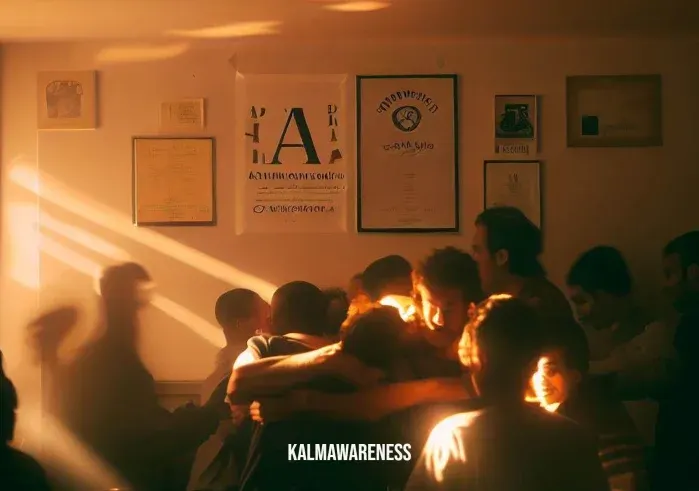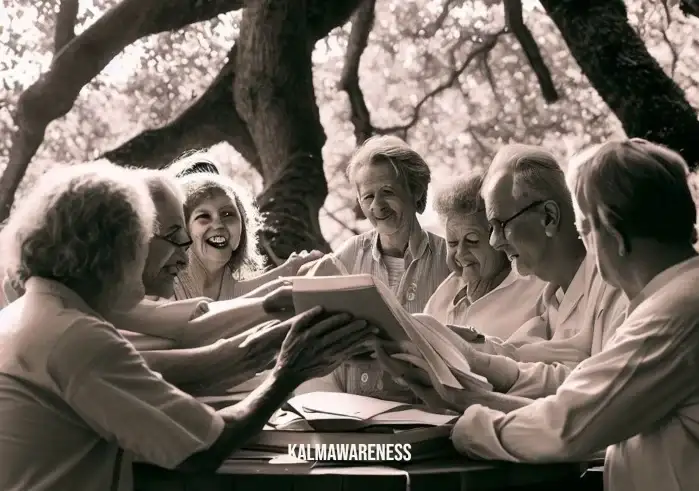Understanding the 12 Traditions of AA: A Long-Form Exploration
The Alcoholics Anonymous (AA) program has a profound impact on the lives of many individuals, fostering a journey of recovery and self-discovery. A fundamental aspect of this program is the 12 traditions of AA, which form the core guiding principles, promoting unity, service, and recovery. This in-depth exploration will help us understand these traditions more fully.
The Cornerstone of AA: The 12 Traditions
When we delve into the traditions of AA, we first need to understand the foundation upon which they rest. The 12 Traditions were created to ensure AA’s survival and provide a framework for conflict resolution within groups. The long-form version of these traditions expounds upon the principles, illustrating how to implement them in practical scenarios, similar to the way AA meditations offer a structured approach to mindfulness and recovery.
1. Unity Over Individuality
The first tradition emphasizes unity and is especially relevant today, given our global interconnectedness. This tradition is like an invisible thread weaving through a fabric, connecting each member in the group. As depicted in our article on human interconnectedness, the principle of unity permeates AA’s approach, facilitating shared experiences and collective progress.
2. Group Conscience: A Guiding Principle
The second tradition underscores the importance of a “group conscience” in decision-making processes. In AA, this isn’t merely a concept—it is a practice. Members collectively seek to understand what is best for the group as a whole, akin to the concerted effort during AA guided meditation. This process cultivates a sense of collective responsibility and mutual respect.
3. Membership and Acceptance
The third tradition is about inclusion and acceptance. It declares the only requirement for AA membership is a desire to stop drinking, opening the door to addiction meditation and recovery for all who seek it. This unconditional acceptance underscores AA’s compassionate approach, fostering an environment where everyone feels valued and supported.
In the next part of our exploration, we’ll continue to unravel the rich tapestry of the 12 traditions of AA. We will uncover the unique blend of values and principles that form the heart of AA. From the importance of autonomy to the spirit of service, each tradition adds a new layer of understanding to this transformative program. The journey into the heart of AA’s 12 traditions promises to be enlightening, just like the tranquil serenity that comes with an AA morning prayer and meditation.

Understanding the Pillars of AA: The 12 Traditions in Detail
As we continue our exploration into the 12 traditions of AA, we find each one is a beacon guiding individuals on their recovery journey. They mirror the profound wisdom found in practices like the AA Step 11 meditation, focusing on prayer and meditation for knowledge and power. The 12 traditions of AA long form offer a comprehensive understanding of the program’s foundational principles.
Tradition Four: Autonomy and Unity
The fourth tradition resonates with the idea of becoming one with the universe. It allows each AA group to be autonomous except when their actions could impact other groups or AA as a whole. This delicate balance between autonomy and unity encourages harmony while still respecting individual group dynamics.
Tradition Five: Carrying the Message
Tradition five underscores the essence of AA – carrying the message to the alcoholic who still suffers. This tradition is deeply tied to the principles of service and empathy, echoing the compassionate outreach depicted in Compassion Day. The primary purpose remains to offer a lifeline of hope to those still battling addiction.
Before we move on to the remaining traditions, it is insightful to see how these principles work together. The following table presents an overview of the first five traditions and their fundamental principles:
| Tradition | Principle | Related Concept |
|---|---|---|
| Tradition 1 | Unity | Human Interconnectedness |
| Tradition 2 | Group Conscience | AA Guided Meditation |
| Tradition 3 | Membership & Acceptance | Addiction Meditation |
| Tradition 4 | Autonomy | Becoming One with the Universe |
| Tradition 5 | Carrying the Message | Compassion Day |
The 12 traditions of AA long form provide insights into AA’s organizational structure, its foundational principles, and its relentless commitment to serving individuals struggling with alcoholism. Understanding these traditions can open new avenues for introspection and growth, mirroring the benefits derived from practices such as the AA On Awakening method.
In the next part of our deep dive into the 12 traditions of AA long form, we’ll delve into the remaining traditions. We’ll explore topics like the role of anonymity, AA’s relationship with outside entities, and the spiritual foundation of the AA program. The exploration promises to be as insightful and enlightening as a quiet moment spent in the AA nighttime prayer and meditation.

Delving Deeper: The Last Seven Traditions of AA Long Form
In this next installment, we’ll delve deeper into the profound wisdom contained within the 12 traditions of AA long form. Just as the AA morning prayer and meditation fills the heart with spiritual strength, these traditions offer insight and guidance to members of AA.
Tradition Six: Non-Endorsement and Non-Affiliation
Tradition six advises AA groups to refrain from endorsing or financially supporting any related facility or outside enterprise. The AA spirit of non-endorsement resonates with the neutrality observed during the global meditation process, where personal beliefs and affiliations are set aside to foster universal peace.
“There is a principle which is a bar against all information, which is proof against all arguments, and which cannot fail to keep a man in everlasting ignorance – that principle is contempt prior to investigation.” – Herbert Spencer
Tradition Seven: Self-Supporting
The seventh tradition maintains that every AA group should be fully self-supporting, declining outside contributions. This tradition underscores the principle of self-reliance and integrity, an ethos shared by the Holistic Life Foundation, which promotes self-care and community service.
“The only man who is worth anything is the man who has just enough to live upon, and who has the courage to work for himself.” – Samuel Smiles
Tradition Eight: Nonprofessionalism
Tradition eight upholds that AA should remain forever non-professional. However, service centers may hire special workers. This tradition aligns with the approach of walking winds holistic center, which emphasizes healing through community-based practices rather than professionalized structures.
“The best way to find yourself is to lose yourself in the service of others.” – Mahatma Gandhi
In understanding the AA traditions, it’s crucial to see them not as standalone principles but as parts of a holistic recovery journey, much like the interconnected poses of a breathe together yoga session. Every tradition is a piece of the puzzle that makes up the 12 traditions of AA long form.
In the final installment of our series, we’ll explore the last four traditions and their significance within the AA community. We’ll discuss aspects like anonymity, principles over personalities, and AA’s spiritual foundation. Expect an enriching exploration akin to the profound experience of AA daily meditation. Join us as we unravel the wisdom in these guiding principles that have helped millions around the world.

Wrapping Up: The Final Traditions of AA Long Form
As we conclude our exploration of the 12 traditions of AA long form, let’s look at the last four traditions. Each carries profound wisdom and guidance, as powerful as the comforting words spoken during AA nighttime prayer and meditation.
Tradition Nine: Organizational Structure
Tradition nine elaborates that AA, as such, ought never to be organized. However, it mentions that service boards or committees can be created to meet needs. This tradition promotes organic growth, akin to the natural, vibrant community found in the lively bunch gathering, promoting genuine interaction.
“We are not human beings having a spiritual experience. We are spiritual beings having a human experience.” – Pierre Teilhard de Chardin
Tradition Ten: Non-opinion on Outside Issues
Tradition ten advises AA members not to offer opinions on outside issues to avoid diverting AA from its primary purpose. The emphasis on focusing on recovery aligns with the concentration required when practicing the Ardas Bhaee mantra.
“The quieter you become, the more you can hear.” – Ram Dass
Tradition Eleven: Anonymity in Public Relations
The eleventh tradition underscores the importance of anonymity in public relations, placing principles before personalities, mirroring the unity seen in the interconnected community.
“True humility is not thinking less of yourself; it is thinking of yourself less.” – C.S. Lewis
Tradition Twelve: Anonymity as a Spiritual Foundation
Finally, tradition twelve states that anonymity is the spiritual foundation of all AA traditions, reminding members to place principles before personalities, much like the collective spirit fostered in chaos and kindness members.
“The measure of who we are is what we do with what we have.” – Vince Lombardi
To better understand the 12 traditions of AA long form, let’s put these final traditions into a table.
| Tradition Number | Tradition Principle | Associated Thought |
|---|---|---|
| Nine | AA should never be organized, but service boards can be created. | Organic growth, authenticity |
| Ten | No opinions on outside issues. | Focus on recovery |
| Eleven | Anonymity in public relations, principles before personalities. | Humility, unity |
| Twelve | Anonymity as a spiritual foundation, principles before personalities. | Collective spirit, humility |
The 12 traditions of AA long form, like the circle of compassion, act as a roadmap for those seeking recovery. They guide individuals on a path of humility, unity, and spiritual growth, offering hope and a shared experience of recovery.
In our upcoming posts, we will continue to explore the intricate facets of AA and its principles. Anticipate insightful discussions mirroring the depth found in AA on awakening meditations. Join us in the next phase of our journey, where recovery meets spirituality and unity.

Understanding the Spirituality Behind the 12 Traditions of AA Long Form
The beauty of the 12 traditions of AA long form lies in the spiritual essence embedded within each tradition. In AA, spirituality is not about religion, but about finding a higher purpose and establishing meaningful connections, much like the profound experiences of black people in meditation.
One cannot discuss the 12 traditions of AA long form without acknowledging the element of surrender. This involves letting go of self-centeredness and developing a deep trust in a Higher Power, whether that be God, the universe, or the collective wisdom of the AA group. The 12th chakra, the gateway to the divine, resonates strongly with this sense of surrender and connection with the divine.
Tradition One: Unity
Unity is the bedrock of Tradition One. It emphasizes that the survival of the individual AA member depends upon unity within the group. This tradition mirrors the cohesive unity demonstrated at the walking winds holistic center.
Tradition Two: Group Conscience
Tradition Two states that a loving God, as He may express Himself in the group conscience, is the ultimate authority. This collective wisdom, or group consciousness, aligns with the connecting consciousness principle, where individuals connect at a profound level.
Tradition Five: Primary Purpose
Tradition Five explains that each AA group has but one primary purpose—to carry its message to the alcoholic who still suffers. This tradition echoes the principles of the clear minds meditation club, where every individual is focused on a common goal.
The spirituality underlying these three traditions is not about a specific religion or faith but about personal growth and transformation, reminiscent of the inner journey facilitated at the mindful baking cafe. To visualize these traditions and their associated spiritual principles, here is a handy table:
| Tradition | Principle | Spiritual Connection |
|---|---|---|
| One | Unity | Group Unity |
| Two | Group Conscience | Higher Power |
| Five | Primary Purpose | Service to Others |
While the 12 traditions of AA long form constitute a framework for group dynamics, they also offer a path towards personal spiritual growth. This dual aspect makes these traditions instrumental in the journey towards recovery and spiritual enlightenment.
Stay with us as we continue our exploration of the spiritual dimensions of the 12 traditions of AA long form in the next chapter. Expect engaging discussions that delve deep into the spiritual facets of the traditions, as captivating as the insights from the May all beings be free from suffering mantra. Your path to recovery and spiritual growth continues.

Embracing the Principles of the 12 Traditions of AA Long Form
As we come to the final chapter of our exploration of the 12 traditions of AA long form, let’s consider how embracing these principles can help us navigate life’s challenges, much like the teachings you might find during a global peace meditation.
Tradition Three: Desire to Stop Drinking
Tradition Three states that the only requirement for AA membership is a desire to stop drinking. This principle of inclusivity parallels the spirit of compassion day, a day dedicated to understanding and helping others.
Tradition Ten: No Opinion on Outside Issues
Tradition Ten suggests that AA has no opinion on outside issues. This neutrality promotes peace and harmony within the group, resembling the harmony within the interconnected community.
Tradition Twelve: Anonymity
Tradition Twelve underscores the significance of anonymity, reminding members to place principles before personalities. This humility and selflessness reflect the ethos of the rise up society, which values unity over individual achievement.
The application of these principles in one’s life can foster a deeper understanding of oneself and others, akin to the self-discovery journey at the mindfulness circle. These principles also remind us that recovery is a shared journey, much like the collaborative efforts of the chaos and kindness members in their community work.
By embracing the principles embedded in the 12 traditions of AA long form, individuals not only support their recovery journey but also nurture their spiritual growth. They foster unity, prioritize collective consciousness, and serve others selflessly, embodying the values that make AA a lifeline for many.
In conclusion, the 12 traditions of AA long form provide a roadmap for living a spiritually rich life, embodying principles of unity, humility, and service. They remind us that recovery is not just about abstinence but about personal transformation and collective healing, akin to the path towards eternal mind link.
So, let us invite you to delve deeper into these traditions, apply them in your life, and discover the transformative power they hold. They are not just principles for recovery, but guidelines for a life of purpose, much like the teachings you might encounter in meditation circles.
Thank you for accompanying us on this exploration of the 12 traditions of AA long form. We hope this journey has been enlightening, and we invite you to continue this journey of self-discovery and healing with our other insightful articles. Remember, the road to recovery is a shared journey, and we are here to guide and support you every step of the way. Let’s continue to embrace these principles and promote healing, unity, and peace.




